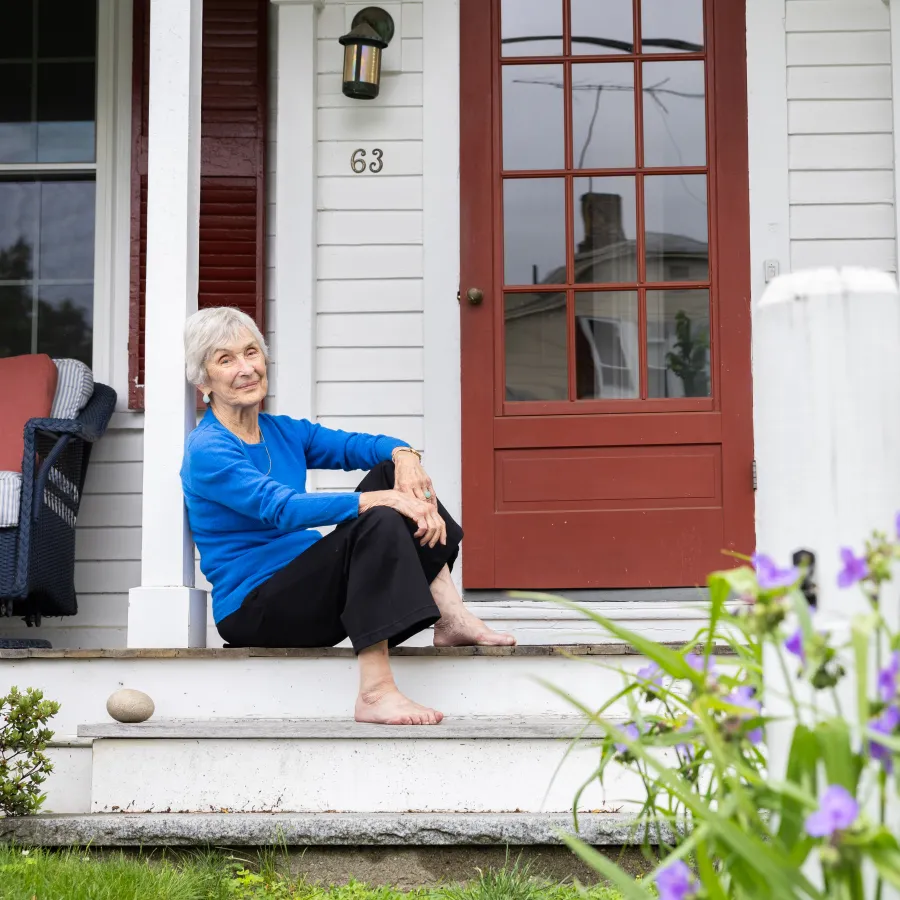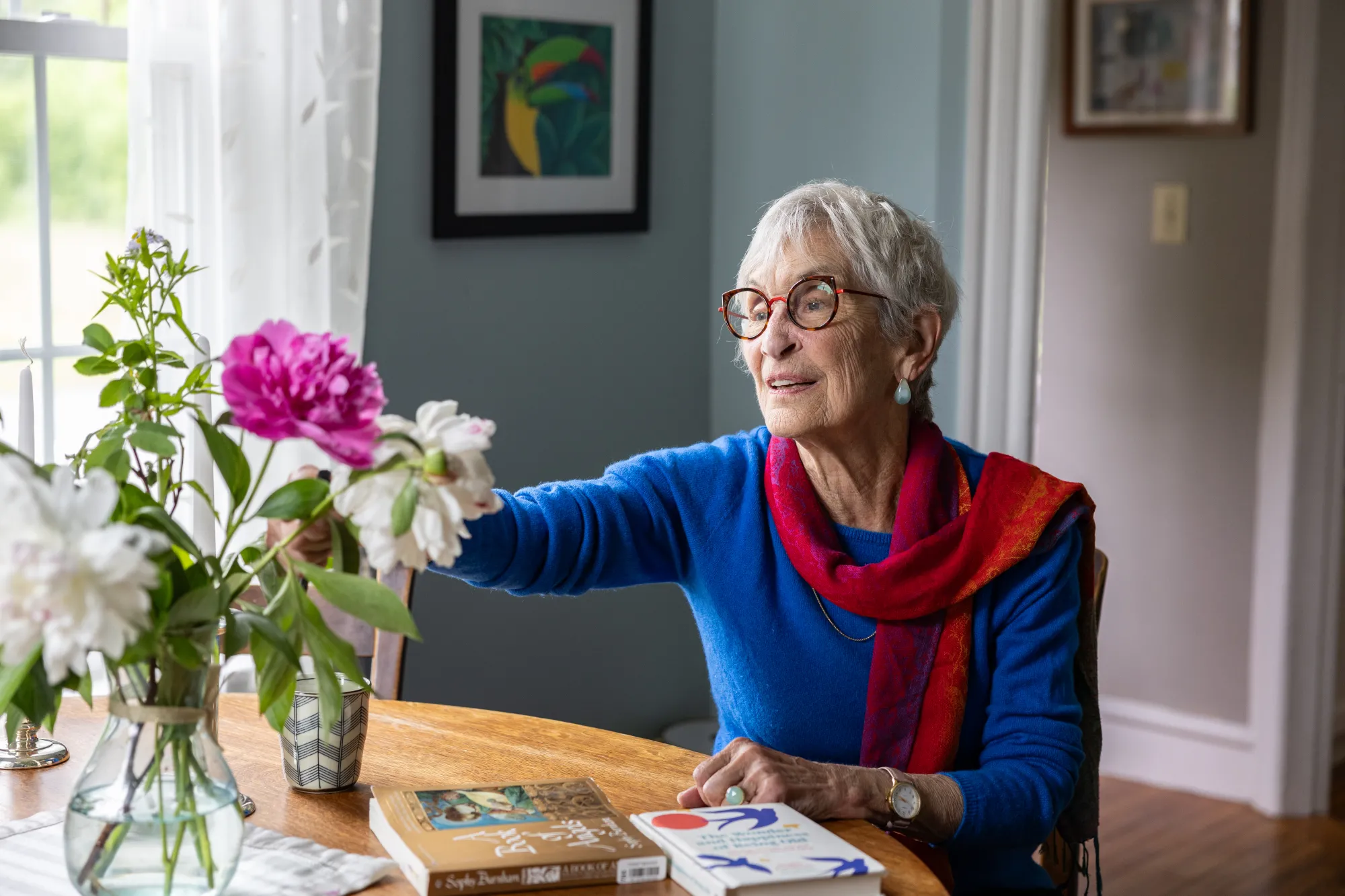Old Age Set Sophy Burnham Free
Smith Quarterly
Once reluctant to reveal her years, the bestselling author now embraces the freedom that comes late in life
Photographs by Jessica Scranton
Published November 17, 2025
Sophy Doub Burnham ’58’s latest book, The Wonder and Happiness of Being Old: Offerings of Hope, Joy, and New Ways to Perceive Aging, is her response to a simple question posed to her several years ago. Picture it: Burnham is sipping espresso at an outdoor café in Paris with her cousin Eleanor, who lives in France. Eleanor will soon turn 60, and she summons the courage to ask Burnham, her 80-something cousin, what it’s like to be old—slightly choking on the word “old,” Burnham notes.
The Wonder and Happiness of Being Old is Burnham’s 17th book. She has written both fiction and nonfiction and has seen three of her titles make it to the New York Times bestseller list, most notably A Book of Angels: Reflections on Angels Past and Present, and True Stories of How They Touch Our Lives. Originally published in 1990, A Book of Angels is credited with sparking an angel craze. Bookstores created whole sections devoted to angels, and angel-themed merchandise—calendars, greeting cards, figurines—suddenly proliferated. That was not at all what Burnham had intended. In 2011, a revised edition was issued and is still in print today.
Back to the café in Paris. “You won’t even notice your 60s!” Burnham blithely replies to Eleanor. “I bought my horse when I was 68!” But she continued to think about the question after she returned home and wrote a series of letters to Eleanor attempting to describe what it’s like to be old from various perspectives. Those letters became the basis for The Wonder and Happiness of Being Old.
“The first letter was all about how I hate old age,” Burnham says. “I was 85 years old at the time, and I wrote about how I hate being looked at and considered old.” Now 88, Burnham confesses she has never felt comfortable about her age. Part of it, she speculates, may be that she could never shake her mother’s voice saying, “You’re too young for this” or “You’re too old for that.” But, she admits, that’s not the whole story. For instance, she had not, until recently, ever told anyone her age, and could not understand why anyone would freely divulge that information. She was even ashamed when she turned 30, feeling she hadn’t yet accomplished what she’d hoped to by then. In the book, Burnham relates instances where her self-inflicted ageism had marked effects on her life, including causing the end of a long-term relationship with a man 20 years her junior. “Part of the reason we split up was that I could not get rid of my own ageism. I was so aware of the difference in age between us,” she says. “It didn’t matter how much he said he loved me. I couldn’t believe it.”
But Burnham is evolving. “When I started the book at age 85, I would never tell my age,” she says. “When I finished the book at nearly 87, writing it had changed me completely, and I was ready to accept it.”
While writing the book, Burnham realized she had laid the foundation for her views on aging as a student at Smith. On the eve of her 21st birthday, she sat at the weathered desk in her room in Sessions House and composed a letter to herself to be opened 21 years later. “I tried to set down who I was, why I was here, and what I thought was important. And to say a few words to my future self,” she remembers. She vowed not to look at the letter for another 21 years—when she turned 42—and she didn’t. The practice continued: Every 21 years, she wrote herself a letter to be opened after the next 21 years.
In rereading the letters, Burnham saw that each 20-year span of adulthood has been a distinct period. “There are different stages from our 20s on, each one building on what came before. I don’t think that in our general culture we understand that,” she says, noting that you are not the same person at 20 as you are at 40 or 60—and that 60 is as different from 80 as 80 is from 100. Most importantly, she emphasizes that being ill and being old are very different states of being. “We are taught that getting old results in diminishment of powers and chronic pains and aches,” Burnham says. “But right now, I’m not sick, and I don’t have dementia, so we must not confuse sickness with old age. And this is a distinction that very few people make.”
During a book reading to promote The Wonder and Happiness of Being Old, Burnham addresses a packed house at the Northampton Senior Center. A petite woman with an on-trend pixie cut, she exudes an effortlessly cool vibe. She is relaxed as she talks to the audience about one of the topics she explores in the book: loss. Loss of loved ones, loss of physical and cognitive capabilities. “I think with every loss you find some other gift,” Burnham tells the audience. “This is also what people don’t understand about being old. I don’t move as quickly or as gracefully as earlier, and sometimes the expression of my happiness seems muted—like a faded color, though I have not lost curiosity or enthusiasm. These days, I spend a lot of time just looking. I marvel at the blue jay at the birdbath, the beautiful rock at the edge of the path. They take my breath away—not in the jumping-jack excitement of children, but with a deep stillness like profound black ocean waters that move far below the sparkling surface of bright waves.” The audience, skewing to the older side of over 60, nods empathically. Burnham continues, “Is this inner stillness what they mean by wisdom? Yet, I look at my children and grandchildren, and I feel they are all wiser than I ever was at their ages. Now, I hardly understand anything at all.” Burnham and the audience laugh knowingly.
Burnham is very much at home in the Northampton area. She relocated there from Washington, D.C., when COVID hit to be near her daughters and grandchildren, plus the man she was then seeing. Both of her daughters live in Florence, Massachusetts. The elder, Sarah Burnham, is a therapist specializing in post-traumatic stress disorder at the local Veterans Affairs Medical Center. Molly Burnham is an educator and award-winning children’s book writer. Burnham has four grandchildren, including one, Beatrice, who is in the class of 2028 at Smith. Burnham had purchased a house in Northampton several years before the pandemic and had boarded her horse nearby, so it was a relatively easy move.
Her routine activities have changed a bit since then. COVID curtailed a devoted yoga practice, and a bad knee has kept her from riding her horse much recently. But she gardens, is an avid walker, and plans to travel to Egypt in November.
In addition to writing, Burnham does psychic readings and is a Reiki master—abilities she says came to her late in life. Her take on spirituality is amorphous, and she is loath to categorize her beliefs. “I’m not sure that there’s a word for what I am,” she muses. “I’m a transcendentalist in the sense that everything seems to be transcendent. I believe in something mysterious that we call God, and that it’s loving and on my side.” Burnham is quick to acknowledge that The Wonder and Happiness of Being Old is written from her perspective as a privileged white American woman. She also points out that she has her down days like everyone else. “I get depressed. I’ll wake up in the morning, and I feel horrible,” she says. “I don’t know why. Sunspots, the humidity. I have no idea. Some days, I have no energy. I don’t mean to say that it is all great, but it is endlessly fascinating.” And she’s not above playing the age card when it makes life easier—for example, by requesting a wheelchair at the airport. “I feel intensely guilty because I don’t really need a wheelchair. But on the other hand, I don’t have to walk for miles,” she admits. “Although, when they see my age, they think, ‘Of course she needs a wheelchair!’”
So, what did Eleanor think of the book she inspired her cousin to write? Burnham says she liked it, but it was Burnham’s sister, Anne Doub Marzin ’57, who lives in Paris, who had the most surprising reaction. Burnham says her sister has always been her harshest critic, so she steeled herself for her verdict. “Anne said to me, ‘OK, I’ve read your book. Are you ready for my thoughts?’” Burnham recalls. “I told her I better stand back. But then she said, ‘I think this is the best book you’ve ever written.’” Burnham smiles.
During her reading at the senior center in Northampton, Burnham poses a question to the audience: “What single word would you use to describe being old?” The response is nearly unanimous: “Freedom!” Burnham agrees. Freedom, she says, is a hallmark of aging. Freedom from judgment, resentment, and control. Especially control. “I’ve learned I’m not in control of anyone or anything—not politicians, not the car that died today or the printer that has a mind of its own,” she says. “Consequently, I find myself with a degree of equanimity that I don’t remember earlier. You don’t feel the same way about who you are and what life is about—and that is the great happiness of being old.”

